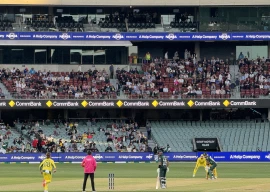
“Accountability, transparency and being subject to criticism are as incumbent upon the judiciary, as it is on the other branches of the state,” says Ali Dayan Hassan, the Director for Human Rights Watch in Pakistan, while talking to The Express Tribune.
Hassan further stated that HRW had been receiving reports of the curbs placed on local media by the judiciary for a long time. However, it was the recent wave of orders by the Lahore and Islamabad High Court seeking to restrict the media’s freedom of expression, which brought the issue into the limelight [See background below].
“While HRW advocates for an independent judiciary globally, we want to emphasise that individual judges and the institution itself cannot place itself above criticism,” said Hassan.
“Just like the other branches of the state, if the judiciary transcends into other domains, there will be criticism as it is the primary tool for a democratic society to keep its different branches in check.”
A history of media clampdowns
Allama Siddiq Azhar, prominent columnist and member of South Asia Free Media Association (SAFMA) feels that the restraints placed by the judges were in line with the historical treatment of media in Pakistan.
“We have a history where freedom of expression has never been appreciated, neither by democratic governments nor by military regimes,” said Azhar.
However, Azhar felt that when a judge gives a decision in court, it becomes public property and it is within the constitutional rights of the public and the media to criticise it. He also added that unless there is an element of disrespect for the institution or an attempt to malign a judge, any attempt to curb the media is an infringement on the rights to freedom of expression.
Need for middle ground
Zahid Ebrahim, a Supreme Court advocate and senior lawyer feels that while courts in Pakistan have withstood exceptional scrutiny and criticism over the years, the judiciary needs to find a middle ground when it comes to the issue of contempt.
“Issuing such a general order is equivalent to imposing censorship and that has a chilling effect on the media. Instead, every specific instance needs to be dealt with in isolation, and in its particular context,” he argued.
Ebrahim also added that there are certain instances where contempt orders are justified, such as when court orders are not being obeyed and when there is an attempt to scandalise a judge.
Extreme measure to counter ‘hysterical, partisan’ media?
Javed Jabbar, former Information Minister and academic also disapproved of a blanket ban by any institution, but added that, “You can’t attribute the blame entirely to one party. Instead improvements are needed on both ends.”
Jabbar stated that it was the lack of self-regulation and the rise of a hysterical, partisan media that prompted such extreme measures by the judges. He also criticised the judges and mentioned that in the last three years, judges made day-to-day observations on cases while their hearings were still under way.
Restraint in frequency and nature of judgments also needed to be exercised by judges, he said.
Background
According to HRW, Judge Shaukat Aziz of the Islamabad High Court issued a restraining order to PEMRA to stop airing criticism of the judiciary on television on October 9. The order was justified by stating that the media ban was meant “to ensure that no programme containing uncommendable, malicious, and wicked material is telecast by any of the channels in which person of the honourable chief justice of Pakistan and other honourable judges of the superior court are criticised, ridiculed, and defamed.”
The group further stated that on November 20, the court maintained the restraining order preventing the airing of critical programming and also demanded a progress report from PEMRA on a television show aired on a private channel which criticised the conduct of Supreme Court Chief Justice Iftikhar Chaudhry. A contempt notice was also issued to the channel’s chief executive officer later on.
Similarly, on October 16, Judge Nasir Saeed Sheikh of the Lahore High Court issued a stay order against the airing of “anti-judiciary” programming on television. The stay order was further extended against airing of television programming “intended to scandalise” the judiciary on November 7 and PEMRA was directed to ensure that the order was implemented.
The statement also mentions that journalists have told HRW about major television stations and newspapers being informally advised by judicial authorities that they would be summoned to face contempt of court charges for criticising or commenting unfavorably on judicial decisions or specific judges.
Furthermore, editors and former editors of several publications faced contempt proceedings in 2010 for publishing a story alleging misuse of office by the Sindh High Court chief justice, which was averted after their papers, apologised publicly to the court.
COMMENTS (18)
Comments are moderated and generally will be posted if they are on-topic and not abusive.
For more information, please see our Comments FAQ





1731062031-0/Express-Tribune--(5)1731062031-0-270x192.webp)
1731065030-0/Untitled-design-(26)1731065030-0-270x192.webp)


1731057827-0/Untitled-design-(25)1731057827-0-270x192.webp)
1731054442-0/BeFunk_§_]-(53)1731054442-0.jpg)






at the moment judiciary look like as a "don" there is no need of big dons in presence of chief justice and his judges,all judges of supreme court and judges of Provincial courts hostage the country no one can ask them,recently public accounts committee has asked the detail of the supreme court expenditure............why the chief became hyper very next day a short statement was given by chief " judiciary is supreme " ary bahi why you are not giving the detail of expenditure it mean you are guilty you are corrupt.
adliya or judiciary should not be criticised if they are adaliya mean if they do justice/adal. but when they dio not do justice/adal then they have no right to of claim either as judiciary/adaliya or the criticism
They will come under criticism if they are unjust, bias, inefficient and immoral.
Judges can be criticized in case they cross the limits set by law. Judiciary is a balance wheel of whole system,shouldn't hope the custodian of judiciary cross the limits.
Media is becoming a monster in itself. But at the same time criticizing the activist judges is a fair game. Judges who only give executive orders instead of judgement, who try to set prices for things instead of jailing the wrong doer. And most of all completely ignore the most critical factor of terrorism and not willing to punish the known and self proclaimed mass murderers.
Of course, but with judges like these you gotta do it at risk of getting jailed without trial. Sigh!
SAFMA itself is so counter-productive to Pakistan. For example, here you have an organization whose leader is Muslim yet publicly insults Islam. It tries to change the opinions of the country by weakening it's ideology by questioning our existence, insulting our founders, and ridiculing one of the few things that almost all Pakistanis have in common which is their religion. Clearly Pakistan was made to be based on Islamic socialism and no other isms. If you have a problem with Islam, go elsewhere! And then making it soft for any attack. SAFMA should be banned in Pakistan just like anti-state media is banned in other countries.
Well there are two things to take care.
Criticism: If it is not for the sake of criticism, than there should not be an issue. Keeping the respect of the institution at all levels, a positive criticism should be allowed. As thats where, we find our weaknesses, all of us. And when I quote, institution it is not limited to SC, it is Army, NA, Senate, and all organizations. I will quote plenty of cases of one single journalist against Musharraf, which in the court he could not prove justified. At that, court should have penalized him for making allegations to Ex president or who ever, and that will be a counted as cleaning of in-competent journalists we all have in country.
No one should be above law: and what ever the law is. we should consider every one to respect it. If it is Arsalan Iftikhar or General Mirza Aslam Baig. Law should be equal for every one. we should not said, Why General is facing FIA, and not Arsalan Iftikhar. I would say This is good, General is facing (facing or not facing FIA for legal jurisdictions for reasons, is a total different issue) FIA, and It would be better if Respected CJ of Pakistan have order a probe agains his son through FIA too. If the half is done right, this is good, Lets pray, we and the sense prevail and rest of the half gets right too.
The statement of HRW is true and correct.The judiciary considers itself above accountability.The constitutional provision of accountability through SJC has been renderd redundant in view of removal/ reinstatament of judges through the SC hearings.The judges should be made accountable to the Parliament as prevalent in the other South Asian countries.The judiciary has also restricted the fundamental right of freedom of speech by arbitrary use of the law of contempt of court which actually has been resurrected through a SC order.
@Tabish Bilgrami:
The words " Sadiq & Ameen " are referred in our constitution to qualify a person like Mr Rehman Malik as basis of his disqualification....can you compare Mr Rehman Malik qualification as a person to be Sadiq & Ameen when he misdeclared his dual nationality & kept on declaring that he had given up his UK nationality in 2008, while docs submitted by him was contrary to his response to SC order....you still think one can compare Mr R Malik with the judges ?
Poets and writers have always criticised God. But this has a different level of dignity
Judicial dictatorship!
We as muslims believe that God Almighty and his Prophets are immune from criticism and no other human being. Judges are the human beings and their judgements and conduct is subject to discussion and criticism throughout the world. In pakistan many judicial decisions has never emitting stigmas which shackled the very foundation of this country and created never ending polarization and division in the society. Were the decisions of Justice Munir, Molvi Mushtaq, Anwar ul Haq and Irshad Hasan Khan deserve any commendation. It is said that the decision of Justice Munir against Molvi Tamizuddin laid the foundation of cesson of east Pakistan. Parocial based decision of SC upholding the death sentence of Bhutto led to worst polarization of the society. How can such decisions and the judges who handed down these decisions can be revered. As for contempt notice to ARY for airing interview of Faisl Raza Abidi, why not SCand IHC issued contempt notice to the culprit and only chose to drag the channel in the court. Faisal Raza Abidi inteveiwed on all electronic media and not only to ARY. Army has stopped behaving like sacred cows. Honourable judges and judiciary should not take their place. Their decisions should speak of their neutrality,wisdom , justice and honour.
Media in Pakistan is trying to pose as savior of this country but do not follow any rules of journalism.or constitution. Some anchor persons who seem to have personal vendetta against the Armed Forces and Judiciary criticize these institutions as if these institutions are against the very existence of this country. I believe the media must stay in its constitutional limits otherwise strict action must be taken against the concerned production houses and anchors.
Tell me what our Constitution said......Plz. change the constitution first.....
So true! You can easily tell other as not Sadiq and Ameen, whereas you are not big enough to listen anything against you! Double standards... HUH :@